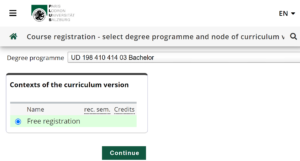Multilingualism
| TYPE | SUPPLEMENTARY STUDY PROGRAMME |
| REQUIREMENTS | 24 ECTS |
| COORDINATION & CONTACT | Assoz. Prof. Mag. Dr. Michaela Rückl |
| COURSE OFFERINGS & REGISTRATION | Winter 2025 / Summer 2026 (PLUSonline) |
| DETAILS | University gazette, 8 August 2016, No. 236 |
Titelbild: © iStock.com/sorbetto
Focus
Multilingualism and cultural diversity are potentials that our society can and should draw from. The acquisition and conscious use of multiple languages is therefore an important educational policy goal, which is also becoming increasingly relevant for businesses in terms of market and competition.
Today, multilingualism is no longer an exception—due to increasing migration and globalization, it is manifesting more and more as the norm. To ensure broad participation in a linguistically and culturally heterogeneous society and to develop multilingualism, as a key feature of Europe, into a trump card, it should be promoted across Europe—not just in foreign language education.
Goal
Educational systems and businesses are (still) insufficiently prepared to utilize and promote the potentials and opportunities of ‘multilingual competence,’ which refers to the ability to efficiently use more than one language for various communication purposes. It also involves acquiring different competencies in different languages at different levels. The interdisciplinary supplementary study programme in Multilingualism…
- Develop new professional and educational competencies that extend beyond linguistic and cultural boundaries, thereby breaking down insular ways of thinking.
- Enhance awareness of the value of individual and societal multilingualism.
- Promote strategies for efficiently using multilingual and multicultural resources in communication and action situations.
- Teach didactic concepts that accelerate and deepen language acquisition processes through networking and individualization.
Target Group
The interdisciplinary supplementary study programme in Multilingualism offer students the opportunity to obtain a certified additional qualification in multilingual competencies. They are aimed at…
- BA and MA students of a philological subject who wish to focus their elective courses on multilingualism.
- Teacher education students with at least one language subject who want to acquire additional qualifications in the field of multilingualism.
Course Offerings
Interested students can choose from courses offered by the departments of English, German, Linguistics, Romance Studies, and Slavic Studies, as well as the Language Center, ensuring a cross-linguistic and interdisciplinary approach tailored to the students’ prior knowledge, needs, and goals.
Structure & Requirements
Basic Module (12 ECTS)
The Basic Module focuses on gaining psycholinguistic and neurolinguistic foundations of multilingualism acquisition and provides an overview of the typology of European languages. Additionally, the opportunities and challenges of multilingual and multicultural communication situations are explored.
Thematic Module in Multilingualism at the School of Education (12 ECTS)
Thematic Module in Multilingualism at the School of Education (12 ECTS):As an alternative to the regular Basic Module, teacher education students of a philological subject can complete the interdisciplinary Thematic Module “Multilingualism” amounting to 12 ECTS points.
The Thematic Module, as a specifically career-oriented offering for teacher education students, provides theoretical knowledge in language acquisition from a psycholinguistic and neurolinguistic perspective. This lays the foundation for analyzing and developing multilingual-promoting language teaching concepts and teaching/learning materials, which are tested and reflected upon in various educational settings.
More information on the thematic modules can be found on the School of Education’s website.
Advanced Module (12 ECTS)
The Advanced Module aims to explore the relationships between multilingualism and society and to apply the theoretical knowledge, competencies, and strategies acquired in the Basic or Thematic Module to one’s own (foreign) language learning in order to expand and deepen multilingual and multicultural competencies individually.
*Courses from your own field of study may only be chosen if they are not part of the mandatory or elective subjects.
Course Registration
Registration for individual courses is done via PLUSonline.
Note: For courses taken as part of the supplementary study programmes, select “Free Registration” during course registration if the option is available:

Certificate
After successfully completing the courses listed above, the following certificates can be requested:
- Basic Module Multilingualism. This will be issued after successful completion of the Basic Module totaling 12 ECTS points.
- Thematic Module Multilingualism. This will be issued after successful completion of the prescribed courses totaling 12 ECTS points by the School of Education.
- Supplementary Study Programme in Multilingualism. This will be issued after successful completion of the Basic or Thematic Module and the Advanced Module, totaling 24 ECTS points.
IMPORTANT: It is possible to include supplementary study programmes and specialisation programmes in the Bachelor’s, Master’s, or Diploma examination certificate (naming of free electives). Regulations can be found in your curriculum, or you may need to reach an agreement with the chair of your curriculum committee beforehand.
Requesting a Certificate
Once you have completed the required courses, submit the completed exam pass and the corresponding certificates to Assoc. Prof. Dr. Michaela Rückl. After verifying the documents, the certificate will be issued by the ZFL – Flexible Learning on behalf of the Vice-Rectorate for Education and Student Experience and will be sent digitally to your university email address.
Issuing the certificate is no longer possible after graduation. Therefore, please make sure to apply for the certificate at least a few weeks before graduation.
If it is not possible to print the academic records from PLUSonline, only submit the completed exam pass.
Download Exam Pass
- Exam Pass Basic Module Multilingualism (12 ECTS)
- Exam Pass Supplementary Study Multilingualism (24 ECTS)
Contact
Assoz. Prof. Mag. Dr. Michaela Rückl
Department of Romance Studies
Erzabt Klotz Straße 1, 5020 Salzburg
Tel.: +43 662 8044 – 4471
E-Mail:





